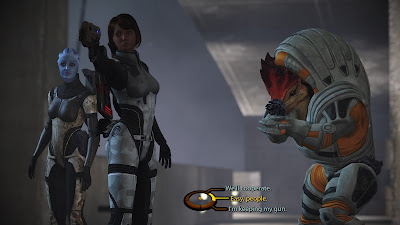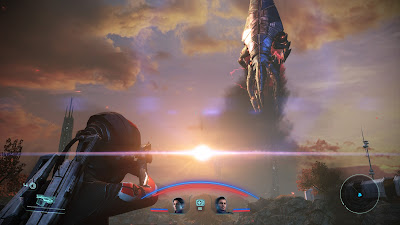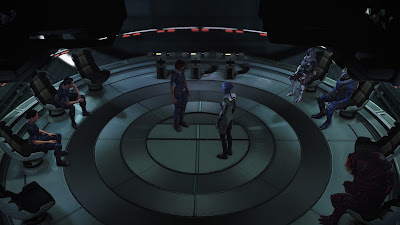Original Release: Mar. 6, 2012 - Mar. 5, 2013. Released for PC, XBox 360. Version Reviewed: Playstation 4 Legendary Edition, 2021.
INTRODUCTION:
The first Mass Effect offered only two pieces of downloadable story content, only one of which was at all substantial. Mass Effect 2 went to the other extreme, with so many pieces of DLC that I thought some of them diluted the game's main story - though its three final "big" expansions were all impressive in their own ways.
Mass Effect 3 splits the difference. There are five DLC expansions, and they are all significant - though on original release, one amounted to putting core game content behind a paywall and another essentially was a patch.
As ever, I will look at these individually, according to release order.
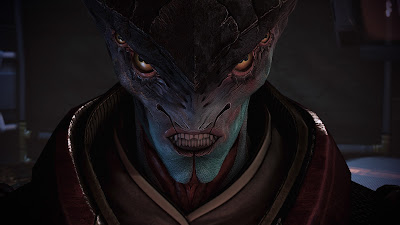 |
| The last Prothean: Javik. He is not what anyone expected - but given his life, everything about him makes sense. |
FROM ASHES:
Release Date: Mar. 6, 2012.
This entire saga began when the first Normandy received word of a Prothean beacon on Eden Prime. Now another Prothean artifact has been unearthed. Shepard and crew expect to find a second beacon. Instead, they discover Javik, a Prothean soldier who was cryogenically frozen at the end of the last Reaper cycle. Instead of the font of wisdom they expect from a Prothean, he is... well, pretty much what an individual whose entire life was a struggle for survival would be: bitter, brutally pragmatic, and scornful that the "primitives" of his cycle are now in charge of the current one.
From Ashes was Day One DLC, and it was instantly controversial. Not because it lacked value: Javik is a fantastic character, and the interactions with him are some of the most interesting in the game. The issue for many was that, save for the forgettable Eden Prime mission, all of the content was already on the disc; buying the DLC amounted to paying for an unlock code.
The Legendary Edition re-release includes this and all DLC fully integrated into the main game. But if you're playing the original version on XBox 360 or Playstation 3, then you'll still have to pay $10 for Javik. If you're in that position, I would reluctantly recommend gritting your teeth and ponying up, as the character adds too much to the story to skip. But I won't argue that making the character into DLC was bad form.
 |
| The Extended Cut doesn't make the ending good, but at least it makes it better. |
EXTENDED CUT:
Release Date: June 26, 2012.
The "Extended Cut" was Bioware's attempt to appease fans who were angry about the original ending. It was released free, making it less a DLC than a patch. This add-on grants players new dialogue options during the final scenes, and it also provides context surrounding the final choice and the reasons behind it. Narrated epilogues make the endings unique, rather than just a choice between "red, green, or blue." The epilogues even include variations based on choices, Paragon/Renegade status, and total war assets, making it feel more meaningful and complete.
As I noted in my main game review, it doesn't fix everything. The ending is no longer a disaster in this form, but it remains underwhelming. A short scene with the Normandy coming down to pick up Shepard's squadmates is actually a change for the worse, because it makes no sense; if Alliance ships can drop down, why are the troops making a suicidal infantry dash?
Still, the extensions to the final conversation and the epilogues make sure that the trilogy feels like it ends rather than merely stops. Had this been in place on release, I doubt there would have been such an outcry. Gamers might have been underwhelmed... but I doubt they would have been as actively mad as they were with the original "red/green/blue" ending.
 |
| Shepard comes into contact with Leviathan. Face to giant face. |
LEVIATHAN:
Release Date: Aug. 28, 2012
Dr. Bryson, an Alliance researcher investigating myths and legends surrounding the Reapers, is murdered by his assistant - who has no memory of having done so. The assistant shows every sign of having been indoctrinated, leading Shepard to retrace Dr. Bryson's steps while investigating an entity known as "Leviathan."
This the first of Mass Effect 3's proper expansions, and it's a good one. The final revelations addmore context to the entire Reaper conflict. They even help to further improve the game's weak ending. More importantly, it's enjoyable to play.
Leviathan includes multiple missions across multiple planets. As with the main story missions, you can do Normandy "rounds" between Leviathan quests, hearing new dialogue and getting additional interactions from your squadmates.
Gameplay is varied. When in Dr. Bryson's lab, you'll be doing detective work, clicking on items and objects to find clues. The three main planetary missions each provide a different style and atmosphere. In one, you will move up ladders and platforms, fighting Reaper forces to reach a contact at the top. Another has a horror movie vibe, as you move through a facility whose entire staff has been indoctrinated. The third is combat intensive, with Shepard battling waves of enemies. The frequent shifts in tone help to keep the gameplay fresh throughout.
In short: Leviathan is good as a story, good as a game, and good as an expansion to the Mass Effect lore. I would label this DLC as indispensable.
Too bad I can't say the same about the next one...
 |
| Aria T'Lok is determined to retake Omega. |
OMEGA:
Release Date: Nov. 26, 2012
Aria T'Lok, crime lord and former ruler of Omega, has been displaced by Cerberus. She wants Shepard's help to regain control, and she promises resources for the war effort. They form an uneasy partnership with Aria's former lover, Turian freedom fighter Nyreen Kandros, to push the invaders out. But Cerberus has a secret lurking the corridors: Reaper-like creations known as Adjutants...
I suspect individual gamers' tolerance for Omega will depend on their opinions of the character of Aria, who is all but ever-present here. If you find anything interesting about this self-proclaimed badass, then you will likely enjoy the many, many cutscenes in which she tells us how tough and cool she is. Me? I find her incredibly tedious. There is nothing less "cool" than someone who constantly insists upon her own "coolness."
For most of its run, the story seems to be setting up a choice between Aria and Nyreen for control of Omega. This could have been interesting, a sci-fi parallel to the Bhelen/Harrowmont choice in Dragon Age: Origins, in which the better person was also by far the worse ruler. Unfortunately, this potential thread is unceremoniously dropped. The biggest moral decision is between suffering a minor inconvenience and perpetrating a terrorist act that will kill thousands of civilians. Never mind renegade. This choice asks the question: Is your Shepard a psychopath?
As is painfully clear by now, I don't have much good to say about Omega. It's wall-to-wall combat... painfully repetitive combat as you mow down hordes of Cerberus baddies through generic corridor after generic corridor. The main villain is dull. The supposedly terrifying Adjutants are visually goofy and remarkably easy to defeat. The main game's Banshees are nightmare fodder; this DLC's Adjutants are like an off-brand knockoff.
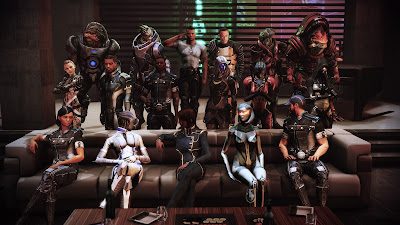 |
| A party on the eve of the apocalypse: Shepard and crew, past and present, enjoy some down time. |
CITADEL
Release Date: Mar. 5, 2013
From the worst DLC to the best...
As the Normandy undergoes a retrofit, Commander Shepard and crew enjoy some much-needed shore leave. Shepard's break is interrupted by intelligence analyst Maya Brooks, who warns that an unknown party is trying to hack into the commander's personal accounts. This sends Shepard in pursuit of an unknown conspiracy - with a very familiar face at the center of it all...
The most notable aspect of the Citadel DLC isn't its story. Don't get me wrong - It's a fun action caper with some surprisingly challenging gameplay and a few priceless character interactions (Two words: Traynor's toothbrush. A third word: Wrex). But the real meat of this expansion comes after you've finished the main campaign.
Once the story is done, a new area is unlocked: The Silversun Strip, a sort of mini-Vegas on the Citadel that includes Shepard's new apartment along with a casino, an arcade, a combat arena, and a ton of background conversations and foreground character vignettes. Highlights include: Grunt's hilariously rowdy birthday bash; Wrex's problems with Krogan mating; Zaeed's obsession with a claw machine; and Samantha Traynor's arcade confrontation with an Asari bully. It's all great fanservice in the best possible way - and it's a lot of fun to see the characters relaxing (or failing to relax) during down time.
It culminates in a grand party at Shepard's apartment, in which characters who have often rarely interacted converse, argue, or conspire. Everyone gets at least one good moment. Zaeed - whom I strongly disliked in Mass Effect 2 - is actually funny and likable, and this is accomplished without changing his characterization; he's just a lot better-written! This is a relief, given that this DLC was actor Robin Sachs's last performance.
It's a delight from start to finish, and the Mass Effect trilogy and its characters are so much richer for its inclusion.
 |
| Shepard stares out at the Normandy before returning to the war. |
OVERALL:
From Ashes is an unfortunate case of paywalling core game content, and I found Omega to be pretty bad. However, the rest of Mass Effect 3's downloadable expansions are worthwile additions. The free Extended Cut DLC makes the ending a bit more palatable; Leviathan offers players a good story and some varied gameplay; and Citadel is a joyous love letter to the trilogy and its characters.
Overall, a fine package of expansions, all of which are included, fully integrated, in The Legendary Edition of Mass Effect 3. If for whatever reason you're playing on Playstation 3 or XBox 360, though, you might want to just skip Omega.
Previous: Mass Effect 3
Next: Mass Effect - Andromeda
Review Index
To receive new review updates, follow me:
On BlueSky:
On Threads:




